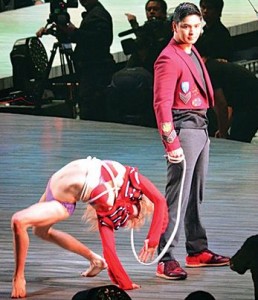Recently, two TV personalities, RR Enriquez and Jeck Maierhofer (who I never heard of until now) were shown in a video where they bothered a sleeping passenger in another car by honking their own car’s horn to wake him up. They soon felt the wrath of netizens, leading them to apologize for their apparent rudeness. While I didn’t pay too much attention to this affair, I believe it proves that celebrities are not meant to be examples for Filipinos.
Yes, many netizens were angered by the behavior of these two celebrities. But the question at the back of my head was: would some Filipinos, if they were in the place of these two celebrities, do the same thing? I would suspect, they would.
| SUPPORT INDEPENDENT SOCIAL COMMENTARY! Subscribe to our Substack community GRP Insider to receive by email our in-depth free weekly newsletter. Opt into a paid subscription and you'll get premium insider briefs and insights from us. Subscribe to our Substack newsletter, GRP Insider! Learn more |
This is why I agree with fellow blogger Kate Natividad that showbiz is representative of the dysfunction of Philippine society: the way celebrities behave is the same palengke attitude as the “masa” observed to have horrid habits. I believe I’ve already mentioned Dennis Roldan and other misbehaving celebrities. Even the DongYan thing is still commented on because it demonstrates my points here.
Also, the theory about many societies is that the elite of a society are the ones that set the trend of common behavior. Today, even showbiz celebrities are considered part of this “elite.” Perhaps the bad manners associated with poor people may actually come from the actors being propped as “examples.” Or, perhaps the producers decided that making actors as “palengkeric” as the masses will help get more viewers. It may be a chicken-and-egg thing, but I believe this point remains true: showbiz fandom is worth discouraging, since the idols of these fans may rub off bad habits on their fans. This point even be further supported by a study saying society’s ‘elite’ are more likely to cheat or lie.
So people are quick to defend stars and idolization of them, perhaps saying, “that’s the way it goes, deal with it.” But this way that goes is also contributing to the dysfunction of the country. Or perhaps they use the so-called greatest excuse of all, “they’re human, they’re flawed, that’s normal.” But if they’re human and flawed, that’s the reason not to make them idols.
The problem with that common saying, “people are flawed, so let’s celebrate our flaws” is that it is also used to defend wrong behavior. While this message is used to just tell people “don’t judge,” there are flaws in people that cause trouble and problems for society, and when you point out these flaws, it is not judging. It is just telling the truth.
Again, in a picture, the analogy of Filipinos and their celebrity idols is like this from the recent Bench fashion show.
Don’t even try to give that baloney that idolization of celebrities is an example of “love for others.” It isn’t.
While there are some celebrities who are actively trying to be good examples, the problem is with the fans, or fantards. And some of these fantards are not even from the masa; they are even from the middle class. Aside from celebrities, the poorer people also take cues from the middle class. If they observe people with money are throwing trash on the street, spitting on the sidewalk or even physically hurting people, they will do the same. The poorer people will say, “if these rich can do it, so can we!” It is their way to defend their dignity (albeit a wrong one). It will have a domino effect: the whole society will follow suit and the whole society falls into a plague of bad and unethical behavior.
Teleserye Effects
Also, let me discuss more on the bad examples of television. Showbiz writer Ricky Lee defended teleseryes by saying that the storylines are supposed to convince people to stop judging people who do wrong. Let’s say certain dramas show teenage pregnancies. Each drama shows the usual theme, the (needless) crying and slapping but, the message is for people to accept and not condemn the teen who got pregnant, and sometimes, even the teen guy who got her pregnant. Especially if they decide to take responsibility for the child. OK, that’s supposed to be a good message.
But here’s the problem: after the message that one should not condemn teenagers who get pregnant gets repeated too often, the teenagers will take a different message from it: having sex and getting pregnant is their right, so the adults should not be angry about it! In a sense, it will encourage teens to be more irresponsible about sex and teen pregnancy. Perhaps when the teen guy refuses to take responsibility for the child, he’ll say, “O, look at the teleserye! It says don’t judge me even if I get someone pregnant!” Despite the intention of the teleserye’s message, teens might even feel encouraged to have reckless sex and get away with it! So, instead of avoiding the problem of teen pregnancy, it may have even helped worsen it.
This proves the fifth law of Gadi Wolfsfeld in Making Sense of Media and Politics: The most important effects of the news (or even entertainment) media on citizens tend to be unintentional and unnoticed.
Perhaps the TV shows should return to being more brutally frank and just portray the more realistic lesson: the moment you make a mistake, you bring yourself down and you suffer the consequences. Also, it’s good that in the U.S., there are a lot of parodies of stars, like the Kardashians and Paris Hilton, and their antics. We sure could use that kind of irreverence in this country.
Just to share a theory: when movies were made, actors were originally not celebrated. Movies were just to be appreciated for what they presented. Then, somewhere along the line, someone thought that actors could be fronted as personalities. Thus, the star system was born as a side effect. And so, actors are used as endorsers and convincers to make people buy things, and therefore spend beyond their means. Fantards are thus the biggest targets of commercialism. That is perhaps one of the greatest uses of celebrity fandom; to enrich some at the expense of others.
While the fault is mostly with the fantard viewers, there is a need to pressure celebrities and “elite” to have better behavior, based on the theory stated above. But certainly, the people should stop looking up to celebrities. They should instead look to themselves and be the examples they want to follow. They could take a cue from this variation I made of the Brotherhood of Christian Businessmen and Professionals slogan:
Be well-behaved and honest.
Even if your favorite celebrities are not.
Even if your favorite celebrities will not.
Even if your favorite celebrities cannot.
I believe, as my cohorts here do, that what Filipinos embrace as their culture is what actually pulls the country down. And those who seem to be anti-dictators, who may also believe themselves to be “heroes,” are the real dictators.



I agree, the fantardism and idolatry are way too much. Seems like fantards don’t have anything more important to do in life but patronize & defend their so called god or goddess at all cost.
Sure wish people would heed. But the competition has mass media commercialism behind them.
Very well said about “fantards should stop looking up to celebrities, that of idolizations & should look at themselves & be the examples they want to follow”. I have been noticing in social media how some fantards are so palengkera, misbehaving & bullies like cropping and captioning pictures of other celebs.
BAKYA is the new social criminal
The indie movie “Ang Babae Sa Septic Tank” kinda proved this too.
What do you expect from people like RR.. di ba naghubad iyan? Malamang ang pamilya niyan palamunin ng showbiz money ni Willie Revillame. But when the horndog wasn’t earning anymore, guess who the wench turned to?
That B.I.T.C.H. loves to play “basketball” and anything that “screws and dribbles in and out”.
they are vile creatures. but still i would fuck the shit out of RR. that bitch has a ridiculous body. uhmm dammn.
And the celebrity response would be analogous to:
“I am not a role model…just because I dunk a basketball doesn’t mean I should raise your kids.” – Sir Charles Barkley (when he still could dunk)
I even read one comment defending a certain celebrity for their behavior saying that: “[S/]He was just being REAL” Lol to that!
There’s this Acer ad on Facebook that seems to demonstrate what I’m saying about commercialized desire. “See how these divas get what they want.” That’s the kind of thing that I was talking about.
Fans need to understand that celebrities aren’t role models, they’re people too and celebrities make mistakes as well. People either put their favorite celeb on a pedestal or shun them whenever they make a mistake.
You get your point across well, ChinoF. People don’t care anymore about untarnished reputation. Out of 10 mothers, four of it don’t have spouse, the other four produced baby before marriage, only two would be happily married before having children. That’s the ugly truth in our society. Good values is not valued anymore. It’s now normal for people to make mistake and to do what everybody else does. And that’s what the media is feeding our people. I agree that people should not look up to celebrities because they are becoming more and more of a bad influence than role models (ideal celebrities value their privacy and would want you to focus on their art and causes and not at them). Showbiz news is mostly composed of teenage pregnancies, two-timers, quarrels between popular stars and family members, cohabitation, separation, abuse, flaunting of wealth, overemphasis on beauty and great bodies, sex scandal, bad mouthing, and switching of GFs and BFs amongst their group or agency. Being mostly a Christian/Catholic nation, we should support good values and strength in people instead of weaknesses and justifying the wrong. The more we’re exposed to this kind of media, the more idle we will become and our head will be filled with gossips and foolish talks. Let’s not limit ourselves to “to err is human” belief because we are also told to be like Jesus instead of just allowing ourselves to be tempted by the evil forces.
Their prank became a news but not that viral. But funny that someone makes this a big deal as if those celebrities are famous. Nyak!
For sure both b(i)tches have loose & overuse p(u)ssies.
It just seems a little close-minded to visualize the poor people as having character that seems all to dependent on the kind of ethics the higher class portrays. .